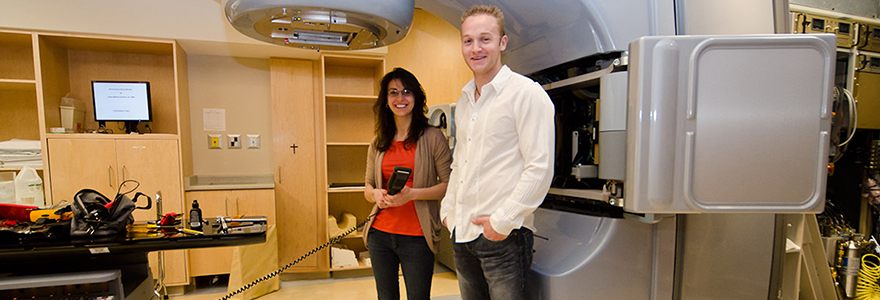Research
Recent Publications
Detective quantum efficiency of photon-counting x-ray detectors
Unified voxel- and tensor-based morphometry (UVTBM) using registration confidence
Radiobiology & Cancer Treatment

The laboratories are located within the London Regional Cancer Program (LRCP) at the Victoria Campus of the London Health Sciences Centre (LHSC). While the research laboratories are located on the fourth floor, students have access to equipment located throughout the facility.
The irradiation facilities include:
- radio-isotope machines (60Co)
- small radionuclide seeds (137Cs, 192Ir, 198Au)
- low-energy X-ray sources (40-125 kVp)
- and linear accelerators which produce X-ray and electron beams with energies up to 20 MeV
Computer resources include a cluster of workstations (SUN, PC's) and special software packages (e.g., EGS4 Monte Carlo code) for the modelling of interactions of radiation with matter.
Radiation dosimetry equipment includes:
- ionisation chambers
- semi-conductors
- film, radiochromic gels, scintillators, thermoluminescence detectors, and calorimeters
Specialized radiation sensors such as a high purity germanium spectrometer are also available. London, Ontario has a long-standing research tradition in radiation therapy. Cobalt-60 was first used in London for cancer treatment in October 1951. We helped develop a new Ytterbium-169 brachytherapy source. The world's first treatment of a patient using this source took place in London in October 1990.
A recent video on The Good Side of Radiation - Biomedical Applications, featuring Dr. Jerry Battista:
Graduate Supervisors in the area of Radiobiology in Cancer Treatment:
Dr. Jerry J. Battista (Retired)
Dr. Glenn Bauman
Dr. Ann Chambers (Retired)
Dr. Jeff Chen (Retired)
Dr. Brandon Disher
Dr. Hatim Fakir
Dr. Aaron Fenster
Dr. Stewart Gaede
Dr. Doug Hoover
Dr. Elizabeth Huynh
Dr. Kevin Jordan
Dr. Scott Karnas
Dr. Craig Lewis
Dr. Robert Stodilka
Dr. Jonatan Snir
Dr. Kathleen Surry
Dr. Jason Vickress
Dr. Aaron Ward
Dr. Eugene Wong
Dr. Viatcheslav (Slav) Yartsev (Retired)
Our faculty and their graduate students conduct research in partnership with globally recognized faculty supervisors and clinicians at state-of-the-art facilities located at Western University, London Regional Cancer Program, Lawson Health Research Institute, Robarts Research Institute, and the London Health Sciences Centre. After graduation, students find rewarding careers in the healthcare sector, biomedical industry, and academia; others pursue further training in professional schools such as medicine, dentistry, or business.
If you have a 4 year Honours Degree (or M.Sc.) in Physics, Chemistry, Engineering, Computer Science, Mathematics, Biology, Medical Sciences or a related field, and are interested in biomedical research, you are invited to apply to our graduate program.








